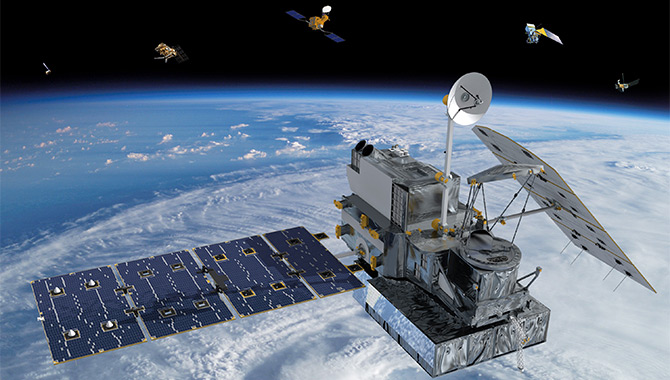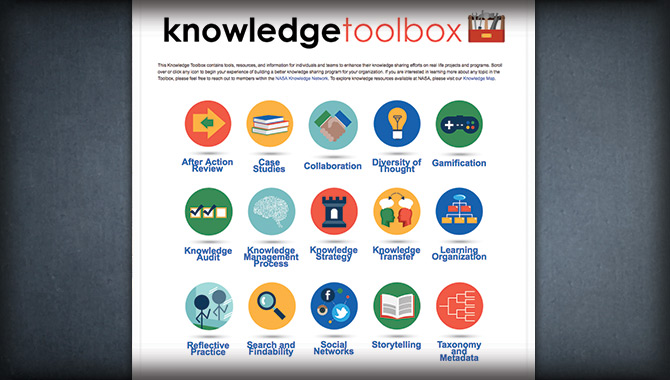
A visualization of the Global Precipitation Measurement (GPM) Core Observatory satellite and partner satellites. The GPM mission, initiated by NASA and JAXA, comprises a consortium of U.S. and international space agencies, including the Centre National d’Études Spatiales (CNES); U.S. Department of Defense, Defense Meteorological Satellite Program (DMSP); European Organisation for the Exploitation of Meteorological Satellites (EUMETSAT); Indian Space Research Organisation (ISRO); and the U.S. National Oceanic and Atmospheric Administration (NOAA). The satellites pictured here are expected to form the GPM satellite constellation.
Image Credit: NASA
Approximately 80% of the projects in which NASA is engaged require collaboration with international partners.
This commemorative was presented on the occasion of the signing of the International Space Station Agreements. Image Credit: NASAIncreased effectiveness of that collaboration has always been a concern of the involved managers. To assist in addressing that concern, the International Project Management Program (IPM) was developed by NASA in conjunction with the International Project Management Committee (IPMC). The objective was to enhance the effectiveness of the member countries’ collaborative project management efforts with each other.
In 2010, the International Astronautical Federation (IAF) established the IPMC, chaired by NASA’s Chief Knowledge Officer, Dr. Ed Hoffman. It comprises a group of more than 25 participating space agencies, companies, and professional organizations. Prior to the founding of the IPMC, there was no mechanism for involving and incorporating inputs from NASA’s international partners. Since the establishment of the IPMC, the IPM course has been held by NASA, acting as the host agency, 11 times at NASA’s Kennedy Space Center in Florida. To date, over 500 participants—including NASA, international partners, and affiliated business organizations—have taken the intensive six-day course. The IPM course is now considered a core course of the Academy of Program/Project and Engineering Leadership (APPEL) project management curriculum.
Eight critical elements have been associated with the establishment of this program: a strong sponsor, a clear mission statement, measurable and specific program objectives, relevant content development, selection of exceptional presenters, selective participant nominations, comprehensive evaluation processes, and committed and integrated administrative support.
STRONG SPONSORS
The NASA Office of the Chief Engineer (OCE) provides strong, stable management oversight to NASA APPEL and to the Chief Knowledge Officer (CKO). Without the commitment of senior NASA management, along with the IPMC, the IPM course could not have flourished as it has for the past six years. The CKO has often stressed that only with support from senior leadership can knowledge-sharing activities be effective and efficient.
THE IPM MISSION STATEMENT
This program will provide project management practitioners with an understanding of cultural challenges, legal concerns and teaming issues that are likely to be encountered when working with international partners. Participants will gain insights into the characteristics of international teaming that have the potential to make or break a project. Two distinct facets of successful international project management will be addressed: technical knowledge of how projects are managed and enhanced cultural understanding. Development modalities should include the use of lectures, small group discussion, individual cultural awareness feedback, hands-on practical exercises, case studies, and opportunities for participants to learn from each other.
SPECIFIC OBJECTIVES
The following objectives were developed to support the provided mission statement:
- Recognize critical elements used in effectively managing projects with international partners.
- Describe significant issues that support or detract from team effectiveness when working with international partners.
- Recognize and appreciate the project management approaches of the European Space Agency (ESA), Japan Aerospace Exploration Agency (JAXA), and NASA, as well as other space agencies and companies that support them.
- Understand behaviors associated with the “softer” side of cross-cultural relations that are needed to be effective in the International Project Management arena.
- Explain the experiential and theoretical knowledge base that discriminates one culture from another.
- Discuss perceptual differences of “ethics” and how such differences can impact international team effectiveness.
- Recognize the legal, regulatory, and other management constraints that project teams must consider in pursuing international projects.
RELEVANT CONTENT DEVELOPMENT
As a first step and in order to achieve the above mission and meet the objectives, the content of previous NASA international project management programs was reviewed. Selected content included: effects of cultural differences, ethical standards in different cultures, functional aspects of the negotiation process, teaming with international partners, negotiating agreements between the United States and other countries, and legal parameters that limit some NASA project manager behaviors. Additionally, sessions had to be developed to provide understanding and insight as to how international partner agencies conducted their projects, capture and share knowledge, and managed their project risk. Examples include the European Space Agency (ESA), Japan Aerospace Exploration Agency (JAXA), and NASA, as well as other space agencies and companies that may support them.
PRESENTER SELECTION
All selected course presenters were able to demonstrate extensive international experience, held postgraduate degrees, and were acknowledged experts in their content areas. Presenters understood the importance of fostering a collaborative and participative environment. It was considered important that participants had opportunities to learn from one another through an open exchange of ideas, knowledge, and best practices.
PARTICIPANT NOMINATIONS
Each participating space agency or NASA center developed a nomination vetting process to screen potential program participants. Senior international space agency managers or NASA Center Directors were solicited directly for potential program nominees. A limited number of seats for each session were made available. If participants were unable to attend for the entire course, they were requested to reschedule until they were able to do so. The goal was to create a community that had the potential to extend international friendships and mutual support for years to come.
To minimize travel costs for non-NASA participants, the partners of the IPMC nominate and prepare participants who could both attend and present at the IPM course. An emergent benefit of participant presenters is their continuing availability during informal times to discuss matters face-to-face and clarify their presented material with other course participants.
CONTINUOUS REVIEWS
Three levels of evaluation are performed for each IPM. Each provides opportunities for participants to reinforce individual learning, identify valuable ideas for their improved performance and/or contribute to the improvement of the IPM.
- Level 1 – Pre-Course Evaluations:
This pre-course survey is included to determine a participant’s entry level of knowledge and perceived level of importance to them of the specific IPM content. - Level 2 – Evaluation of Each Session and Presenter:
An evaluation of each session provides an enriched basis for analysis and informed program modifications and presenter recommendations as appropriate, allowing for lessons learned to be distilled. - Level 3 – Post-Course Evaluations:
The Post Course Evaluation is included to determine the participant exit level of knowledge and perceived level of importance to them of the specific IPM content.
COMMITTED AND COMPETENT ADMINISTRATIVE SUPPORT
No program can be successful without continuous attention being given to the details required for the program’s success. The discussion and negotiation of these details may extend for as long as six months between program offerings. The administrative team must be considered as full participating members with the program designers and faculty. They provide critical insights when support activities require coordinated efforts.
In summary, the Critical Elements associated with the development of a highly successful International Project Management Development program are:
- A strong sponsor
- A clear mission statement
- Measurable and specific program objectives
- Relevant content development
- Selection of exceptional presenters
- Selective participant nominations
- Comprehensive evaluations process
- Committed and integrated administrative support
CONCLUSION
The attention and support to excellence, demonstrated by the NASA OCE, the IAF and members of the IPMC, the NASA CKO, and NASA APPEL, has supported the development of greater levels of cooperation between international partners and associated industry professionals. As the program continues, lessons learned are distilled as they arise and are infused back into processes for upcoming courses. Responses from participants have clearly established this program as a leading practice in the development of international project management cooperation and understanding.









